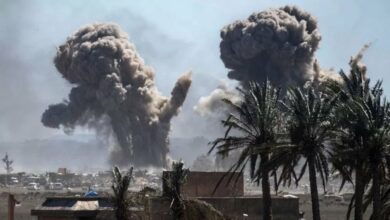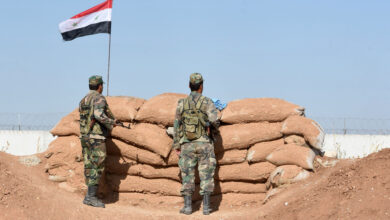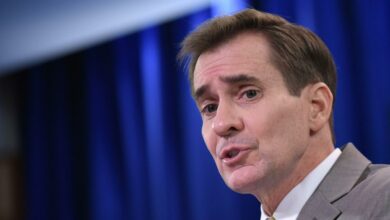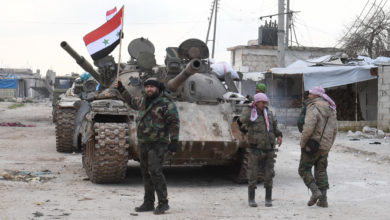US wants guarantees that Turkey will not ‘endanger’ Syria partner forces after troop withdrawal
US National Security Advisor John Bolton said Turkey should not undertake military action in Syria that is not agreed to by the United States
National Security Advisor John Bolton said that the withdrawal of U.S. troops from Syria is dependent on conditions being met, including that Turkey should not endanger American partner forces in Syria.
He was speaking in Jerusalem on Sunday, December 6 during a four-day trip to meet senior officials in Israel and Turkey alongside the Chairman of the U.S. Joint Chiefs of Staff General Joseph Dunford, and Special Representative for Syria Engagement James Jeffrey, who assumed the additional role of Special Envoy to the Global Coalition against Islamic State last week.
The meetings will discuss the withdrawal of U.S. forces from Syria, the ongoing battle against ISIS and countering “Iranian malign behavior in the region,” Bolton tweeted on Friday.
US withdrawal a ’cause and effect mission’
Following President Donald Trump’s controversial December 19 announcement that U.S. troops would withdraw from Syria, much attention has focused on the timeframe and scale of the drawdown.
Critics say the move to withdraw American troops puts U.S. partner forces in Syria at greater risk of a long-heralded Turkish military operation against Kurdish forces in territory controlled by the Coalition-backed Syrian Democratic Forces alliance.
The predominantly Kurdish People’s Protection Units (YPG) forms the core of the multi-ethnic SDF which is waging the ground campaign against ISIS in Syria. Turkey considers the YPG inextricable from the Kurdistan Workers’ Party (PKK), which is designated a terrorist group by Ankara and its Western allies, but the YPG is not a proscribed organization in the European Union, United Kingdom or United States.
U.S. officials have also expressed concern that any Turkey-led incursion would put Coalition forces at serious risk.
Trump initially wanted troops to leave within 30 days, but has since agreed to allow several months for an orderly withdrawal, the New York Times reported.
“We’re going to be discussing the president’s decision to withdraw, but to do so from northeast Syria in a way that makes sure that ISIS is defeated and is not able to revive itself and become a threat again,” Bolton said.
He said the U.S. would “make sure that the defense of Israel and our other friends in the region is absolutely assured,” and “take care of those who have fought with us against ISIS and other terrorist groups.”
“This is a cause and effect mission,” Bolton said.
“It’s not the establishment of an arbitrary point for the withdrawal to take place as President Obama did in the Afghan situation,” he said.
“There are objectives that we want to accomplish that condition the withdrawal,” Bolton said. “The timetable flows from the policy decisions that we need to implement.”
“Timetables or the timing of the withdrawal occurs as a result of the fulfilment of the conditions and the establishment of the circumstances that we want to see. And once that’s done, then you talk about a timetable.”
His comments echo hasty discussions between U.S. officials following Trump’s decision to withdraw from Syria exclusively reported by The Defense Post in December. It was apparent in those discussions that the administration had been planning for an announcement during Trump’s State of the Union address in late January or early February.
Senior State Department officials, in coordination with the Defense Department, then began to develop a plan to attempt to convince “the highest levels” of the government not to commit to a pull-out date by emphasizing that the safety of U.S. troops was paramount.
They stressed the need for a step-by-step drawdown process in the hope of salvaging U.S. objectives in Syria, including the “enduring defeat of ISIS,” the withdrawal of Iranian forces from Syria, and a negotiated political settlement to the conflict in line with United Nations Security Council Resolution 2254.
“We need time to work this. We need to work this with the Kurds, we need to work this with the Turks. We need to work this with the rest of the international community which is in shock right now,” one official said.
Turkey should agree all military action in Syria with US
Trump’s withdrawal decision was made during a December 14 phone call with Turkey’s President Recep Tayyip Erdogan, and the two leaders reportedly agreed that Turkish forces could take the lead in the fight against Islamic State in Syria.
Bolton said that in meetings with Turkish officials, he will seek “to find out what their objectives and capabilities are and that remains uncertain.”
“We don’t think the Turks ought to undertake military action that’s not fully coordinated with and agreed to by the United States at a minimum so they don’t endanger our troops, but also so that they meet the president’s requirement that the Syrian opposition forces that have fought with us are not endangered,” Bolton said.
Asked if this meant the U.S. would not withdraw until Turkey guaranteed the safety of Kurdish fighters, Bolton said, “Basically, that’s right,” Reuters reported.
“What can we tell them?”: US general pressed for reassurance for SDF after Syria withdrawal decision
Citing a senior administration official, the Wall Street Journal last week reported that the U.S. military was “prepared to help Turkey with the logistics of an intervention that could extend hundreds of miles from the Turkish border to the Islamic State strongholds in Syria’s Euphrates River Valley.”
The U.S. is currently in talks with Turkey over extensive American military support including airstrikes, transport and logistics, the Wall Street Journal reported on Friday. One official said the U.S. is unlikely to provide all of the support requested, particularly the air support.
Bolton said General Dunford will continue negotiations with his Turkish counterparts this week to seek protection for America’s Kurdish partners in Syria, the Associated Press reported.
US may retain control of northern Syria airspace
A senior administration official who is travelling with Bolton said on Friday that the U.S. is also discussing the possibility of maintaining control of the airspace over northeastern Syria, the Wall Street Journal reported.
Officials from the SDF and Democratic Union Party (PYD), the political arm of the YPG, have called on the U.S. to implement a no-fly zone over northern Syria to protect against Turkish attacks in the past, and the Bush administration’s 1991 decision to establish a no-fly zone over northern Iraq was mentioned during the conversations between U.S. officials in December.
In meetings in Paris with northern Syria officials, French officials were receptive to requests for a no-fly zone over northern Syria, but said they needed to consult with the European Union and gain Washington’s permission first, Ilham Ahmed, co-chair of the Executive Council of the SDC, the political arm of the SDF, told The Defense Post
“We have no other options,” Ahmed said. “If there is a Turkish incursion, they will conduct airstrikes.”
US tells Kurds not to make deals with Assad or Russia
Bolton said the U.S. has asked its partners in northern Syria to refrain from making deals with Syrian President Bashar al-Assad’s government or with Russia.
“My impression is those meetings in Moscow did not go well,” he said, referring to discussions between northern Syrian and Russian officials in Moscow last week, Bloomberg reported.
“I think they know who their friends are,” he added.
The U.S. has “told the Kurds our best judgment is that you stand fast now,” he said, NBC reported.
But Rêdûr Xelîl, a senior SDF official and past YPG spokesperson, told AFP on Saturday a deal between the Syrian government and the autonomous administration in northern Syria is inevitable because SDF-held areas are part of Syria.
Xelil also said that negotiations are ongoing with the government over the administration of Manbij, and if the talks lead to a solution that “protects the rights” of Manbij residents, similar arrangements could be applied to SDF-controlled areas of Deir Ezzor province, east of the Euphrates river, said.
“We still have some differences with the central government, which need negotiations with international support,” Xelil said, adding that regime backer Russia could act as a guarantor state.












One Comment